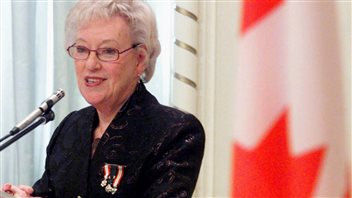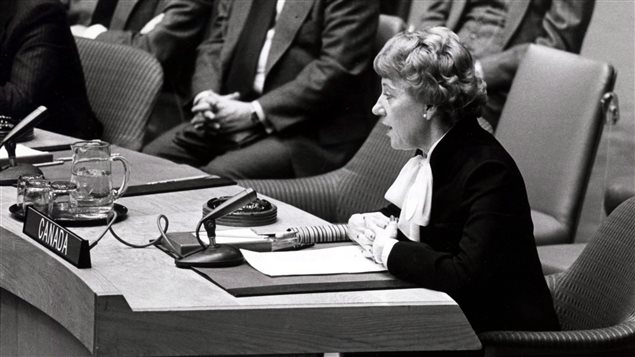Flora MacDonald, the pioneer politician, who said she was not a feminist, is being remembered and honoured at her funeral today in Ottawa, Canada’s capital.
The funeral had to be moved to a larger church to accommodate all the politicians and former colleagues who wanted to attend. Former Prime Minister Joe Clark will be there, as well as former Prime Minister Brian Mulroney, and so will Professor Emeritus John Meisel, of Queen’s University’s Political Science department.
“Mr. Diefenbacker is going to fire me”
Professor Meisel was instrumental in Flora MacDonald moving to Kingston, Ontario, to administer his department when he became head. This was eventually the riding she represented as a Member of Parliament from 1972 to 1988. Professor Meisel says she was greatly respected and appreciated by constituents. He says she was a sometime social worker.
ListenHe got to know her in the early 1960’s, as he was researching books on Canadian elections, and Flora was then secretary to the head of the Conservative Party. She said her excellent shorthand skills served her well the rest of her life, in both preparing for question period in parliament, and in taking notes in meetings and gatherings where the proceedings mattered.
When her time at Conservative Party headquarters seemed to be up, she decided to take Professor Meisel up on a previous offer of employment at the university. Telling him “Mr. Diefenbacker was going to fire her” she moved to the small city of Kingston, Ontario, on the St. Lawrence River.
She was the third woman to run for the leadership of a major party. but hers was the biggest campaign. In 1976, she was defeated by Joe Clark, who later appointed her Secretary of State for External Affairs, the first woman to serve in the position and during a most challenging time. The Iran hostage crisis took place on her watch, with Canada playing such a dangerous role in housing the hostages. She also served as a the Employment and Immigration minister, and minister of communications.

Perhaps it was in her humanitarian work after politics, however, where she left her deepest mark. She was fascinated with Afghanistan, and worked tirelessly to help woman and girls gain access to education. Professor Meisel tells the story of her encouraging the Afghan Minister of Parks to put aside vast swaths of another beautiful landscape, just as one of her mentors, John A. MadDonald, a founding father of Canadian Confederation, had done in 1867. His legacy is some of our most beautiful national parks. Perhaps Flora MacDonald’s is one of the beautiful parks now in Afghanistan.
Professor Meisel said, “Flora was one of these people that was completely engaged and if she saw something that needed fixing she would roll up her sleeves, so to speak, and start fixing. And so she became very much involved in all kinds of things that were not really narrowly politics.”







For reasons beyond our control, and for an undetermined period of time, our comment section is now closed. However, our social networks remain open to your contributions.